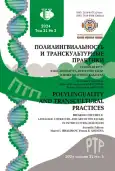“Genre Memory” as a Category of Comparative Poetics (Based on Elegy in Russian and Tatar Literature of the 2nd half of the 20th - 21st centuries)
- Authors: Khabibullina A.Z.1
-
Affiliations:
- Kazan (Volga Region) Federal University
- Issue: Vol 21, No 3 (2024): BREAKING THE CIRCLE: LANGUAGE, LITERATURE, AND ART OF THE TATARS IN INTERCULTURAL DIALOGUES
- Pages: 493-504
- Section: LITERARY SPACE
- URL: https://journal-vniispk.ru/2618-897X/article/view/326916
- DOI: https://doi.org/10.22363/2618-897X-2024-21-3-493-504
- EDN: https://elibrary.ru/UXZWPE
- ID: 326916
Cite item
Full Text
Abstract
The article considers the “genre memory” as a theoretical notion on the material of elegy established in Russian literature in the 2nd half of the 20th - 21st centuries (A. Dragomoschenko, B. Popov, S. Gandlevsky) and in the works of modern Tatar poets F. Safin, G. Morat, R. Zaidulla. The study is aimed at considering the elegiac poetry in national literature in the context of “genre memory”. The author concludes that the appeal to multilingual elegy provides an opportunity to examine the genre category of “memory” not only through the achievements of historical poetics, but also in the scientific discourse of comparative studies, in particular comparative poetics. It is stated that the elegy in the lyrics of A. Dragomoschenko and B. Popov loses its genre identity and acquires an ironic beginning. In Dragomoshchenko’s “Elegy the Second in a Row,” changes in poetics are marked by going beyond the usual syllabic structure of the poem, turning to a completely different “logic of writing”. Special attention is paid to intertextuality. It is concluded that intertextuality in the elegiac poetry of modern Tatar authors has nuances in contrast to the attention to the “foreign” word that has developed in Russian literature. An appeal to the “alien” texts in elegies by F. Safin, R. Zaidulla, G. Morat does not lead to irony, but on the contrary, it takes the reader back to the traditional images of national poetry and folklore, strengthens the “Tatar sound” in the genre, and highlights features of originality (for instance, in the elegy of G. Morat there are images of Sak and Sok, in the poem by F. Safin Sabantui holiday is mentioned). On the other hand, this technique is a transformation factor of the “memory” elegiac genre, which manifests itself in its gradual convergence with other forms and discourses in literature.
About the authors
Alsu Z. Khabibullina
Kazan (Volga Region) Federal University
Author for correspondence.
Email: alsu_zarifovna@mail.ru
ORCID iD: 0000-0002-3332-4066
Doctor of Philology, Assistant professor of the Department of Russian literature and teaching methodology
18, bldg. 1, Kremlevskaya St, Kazan, 420008, The Republic of Tatarstan, Russian FederationReferences
- Lejderman, N.L. 2010. Genre theory: scientific edition. Institut filol. issledovanij i obrazov. strategij «Slovesnik» UrO RAO, Ural. gos. ped. un-t. Ekaterinburg: UrGU. Print. (In Russ.)
- Khabibullina, A.Z. 2022. Elegy, elegiac, elegism in Russian and Tatar poetry. Diss. Thesis. Kazan. Print. (In Russ.).
- Bakhtin, M.M. 1972. Problems of F.M. Dostoevsky’s poetics. 3rd edition. Moscow: Khudozh. lit-ra publ. Print. (In Russ.)
- Jurchenko, T.G. 2001. Genre memory. Literary encyclopedia of terms and concepts. Moscow: NPK “Intelvak” publ. Print. (In Russ.)
- Gachev, G.D. 1968. The content of artistic forms (Epos. Lyrics. Theatre). Moscow: Prosveshhenie publ. Print. (In Russ.)
- Averincev, S.S. 1996. “Genre as abstraction and genre as reality: the dialectic of closedness and openness.” In Rhetoric and the origins of the European literary tradition. Moscow: Shkola ‘Yazyki russkoi kultury’. Print. (In Russ.)
- Lipoveckij, M.N. 1990. ‘Genre memory’ as a theoretic problem (to the history of issue). Modifications of artistic systems in the historical and literary process: collection of scientific works. Sverdlovsk: UrGU. Print. (In Russ.)
- Artjomova, S.Ju. 2020. Transformation of genres of Russian lyrics in the XX century: Doctor Diss. Thesis. Tver. Print. (In Russ.)
- Zejfert, E.I. 2021. “ ‘Premature work’ by Arkady Dragomoschenko.” Novoe literaturnoe obozrenie, no. 170, pp. 197–215. Print. (In Russ.)
- Senderovich, S. 1982. Alethea. Pushkin’s elegy “Recollection” and the problems of his poetics. Wien: Wiener Slawistischer Almanach. Print. (In Russ.)
- Orlickij, Ju.B. 2021. “Features of “quantum” writing of Arkady Dragomoschenko.” Novoe literaturnoe obozrenie, no 170, pp. 219–236.
- Zagidullina D.F. 2023. “Ozyn Shigyr” in modern Tatar poetry.” Polylinguality and Transcultural practice, vol. 20, no. 2, pp. 322–333. https://doi.org/10.22363/2312-8127-2023-20-2-322-333 (In Russ.).
- Skvorcov A.Je. “Modern Russian elegy. About a poem by Oleg Chuhontsev.ˮ Day by day. Nauka, obrazovanie, kul’tura. (In Russ.). 20 Dec. 2023, https://www.den-za-dnem.ru/page.php?article=1479
Supplementary files









